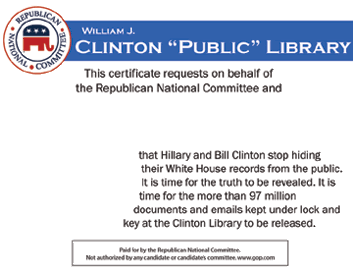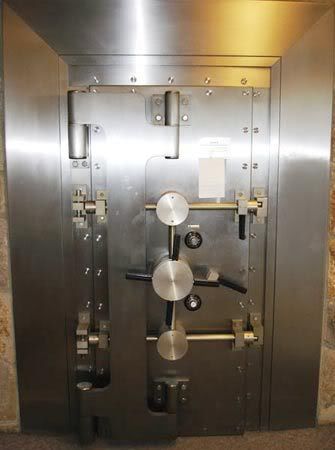UPDATE: And as usual, Republicans are up to their usual shenanigans, this time trying to divert Americans' attention by misdirection, by making false claims ("Bill and Hillary Clinton are responsible for preventing the release of Presidential papers"):
 The Presidential Records Act of 1978 would have released presidential records had it not been for Bush's Executive Order. Why isn't the RNC pressuring Bush to rescind his order?
The Presidential Records Act of 1978 would have released presidential records had it not been for Bush's Executive Order. Why isn't the RNC pressuring Bush to rescind his order?A District Court in the District of Columbia has ruled that an Executive Order issued by President George W. Bush in 2001, which severely slowed or prevented the release of historic presidential papers is, in part, invalid.
In a carefully constructed decision, the court held that the Archivist of the United States acts arbitrarily, capriciously, and contrary to law by relying on the Executive Order to delay release of the records of former presidents. The court did not reach the issue of whether it was permissible for President Bush to extend the authority over disclosure of presidential papers to a former president’s heirs or to former vice presidents.
The underlying lawsuit, which was filed in November 2001 by the National Security Archive and other plaintiffs, challenges President Bush's Executive Order 13,233 that gave former Presidents and their heirs (as well as former Vice-Presidents for the first time) indefinite authority to hold up release of White House records. In finding that the plaintiffs have standing to pursue the claim, the court specifically referenced the delays experienced by the National Security Archive for requests pending at the Ronald Reagan Presidential Library. As the Archive’s Director Thomas Blanton testified in Congress this past March, those delays have grown from 18 months in 2001 to “an estimate of 78 months (six and a half years!) [in 2007].”
Archive General Counsel Meredith Fuchs commented, “The court is enforcing procedural standards, but has avoided the hard questions about the role former presidents, former vice presidents, and their heirs can play when it comes to disclosure of presidential records.” She noted, “Unless the Executive Order is reversed or withdrawn, decisions about the release of records from this administration may ultimately be made by the Bush daughters.”
And can Bush or his brothers object to the release of Reagan's papers in whose administration Bush's father was vice-president? And what about the liberal-libertarian independent Ron and Patty Reagan? What if they want their father's papers released, but their neoconservative brother, Michael Reagan (the son adopted by Reagan during his first marriage to Jane Wyman), doesn't agree?
The decision comes at a time when a bill that would overturn Executive Order 13,233 is stalled in the U.S. Senate, reportedly due to a hold placed on the measure by Senator Jim Bunning (R-KY). The bill, H.R. 1255, was approved in the U.S. House of Representatives on March 14, 2007 by a vote of 333-93. The White House has threatened to veto the bill if it is passed in the Senate.
BACKGROUND
The Presidential Records Act of 1978 (PRA) emerged from the scandals of the Nixon presidency to require former presidents to release their records no later than 12 years after they leave office. Under the PRA, as amended, the U.S. government asserts complete "ownership, possession, and control" of all Presidential and Vice-Presidential records. Upon conclusion of the President's term in office, the National Archivist is required to assume custody of the records, and to make them available to the public when permissible under the PRA. Access to the records can be denied after the end of the 12-year embargo only if a former or incumbent president claims an exemption based on a "constitutionally based" executive privilege or continuing national security concern.
On February 8, 2001, shortly after President Bush came into office, he was notified of a scheduled release of Reagan presidential records (68,000 pages of records). His legal counsel requested two successive 90-day extensions of time to review the records prior to their release followed by a third request for an indefinite extension of time so that the White House could evaluate the legal framework and process that would govern release of the records. This was followed on November 1, 2001 with the issuance of Executive Order (E.O. 13,233) that gives the White House and former presidents uncontrolled discretion in deciding whether to deny the release of documents requested by journalists and scholars.
These papers serve and belong to the American people.

